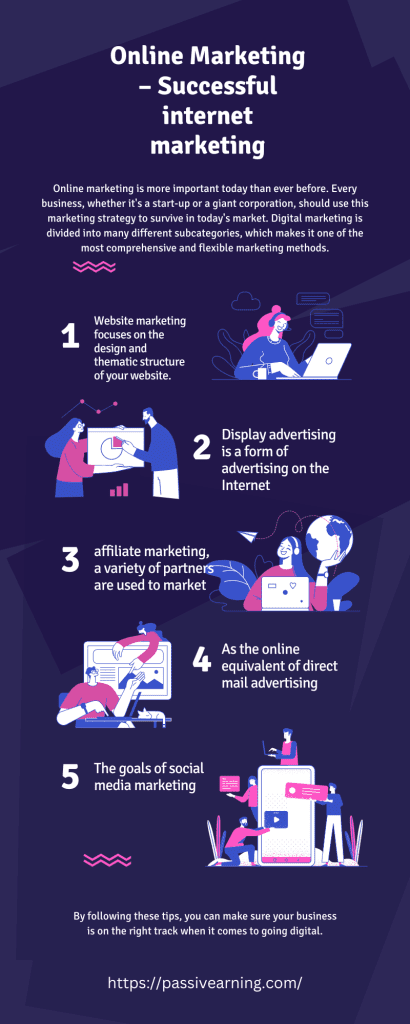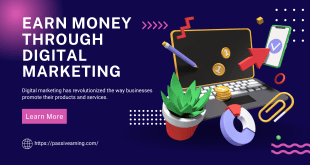
Online marketing is more important today than ever before. Every business, whether it’s a start-up or a giant corporation, should use this marketing strategy to survive in today’s market. Digital marketing is divided into many different subcategories, which makes it one of the most comprehensive and flexible marketing methods.
Online Marketing Definition – What is Online Marketing?
The term online marketing (also web marketing or internet marketing) includes all marketing activities and measures that are implemented online on the internet.
Online marketing is just one part of a company’s marketing, but in recent years it has proven to be a very conventional marketing strategy and now belongs in every company’s marketing mix.
Every company can define the goals of online marketing for itself which range from brand awareness to collecting contact data to the successful purchase of a product.
Online marketing offers various channels and measures to achieve these goals, including website marketing, search engine marketing, email marketing, social media marketing, and affiliate marketing. More detailed information on the different online marketing channels can be found below in this article.
Online Marketing Goals – What do I need online marketing for?

As already mentioned, the specific goals of online marketing are different for each company and should be specifically tailored to other marketing measures. In the long term, the overarching goal of any online marketing measure is to increase the company’s sales in some way.
Even if measures are “only” intended to strengthen your own brand, i.e. for branding, these measures will have a positive effect on your company’s sales in the future.
In general, the goals of online marketing can be summarized in 4 main goals:
- Branding/ product and brand awareness: This includes traffic, i.e. This can be done organically using various company-relevant terms or brand terms. In addition, mentions on the Internet on social media or in blogs & forums make your company better known. You can also strengthen your corporate brand through various advertisements in the search results or via display ads on other websites.
- Lead generation/customer acquisition: This goal involves collecting contact information from potential customers. This can include e-mail addresses, telephone numbers, or complete contact forms. With this information, you can then win the people over as new customers.
- Engagement/Loyalty: This goal aims to increase engagement with your business, brand, and product or service. This works very well on social media platforms through interesting postings, which are commented on and liked a lot. It is important to implement compelling content on your own website so that people stay longer on your website and read several articles, for example. In the best-case scenario, you bind your customers so strongly that they visit your website regularly to stay up to date.
- Increase sales: A classic goal for an online shop or e-commerce platform. With good online marketing, the number of orders in your online shop can often be increased significantly and then scaled up very well once you have found the right online marketing strategy for your product or service.
Overview of the various online marketing channels
Site marketing
Website marketing focuses on the design and thematic structure of your website. This should have a user-friendly design so that users feel comfortable on your website. This increases the length of time users stay and the conversion rate of your website.
In general, a customer-oriented presentation of the company and the products is one of the goals of website marketing, because this fulfills the purpose of a company website: retaining existing customers and recruiting new customers.
The technology of your website also plays a decisive role in website marketing. Larger technical problems are to be avoided and are not welcomed by Google or users.
Your page should not contain any unreachable pages or broken links and should also have the fastest possible loading speed. This can be made possible by clean source code and suitably compressed images.
Responsive development for mobile devices is becoming more and more relevant these days. This guarantees optimal use of your website from mobile devices, which has gained enormously in importance because now every third person accesses a website from a mobile device.
Search engine marketing
The aim of search engine marketing (SEM) is to attract visitors to your website via various web search engines such as Google or Bing. Good SEM improves your visibility within search engine result pages (SERPs).
Search Engine Optimization (SEO)
The goal of SEO is to attract visitors to your website through organic search results. Organic search results are the search results that are rated as relevant by the search engine algorithm for a specific keyword.
The algorithm uses many different factors to decide which website is displayed at the top of the SERPs. SEO tries to recognize these factors and take measures to influence them positively.
This also includes website marketing, because a short loading time and responsive design for mobile devices also has a positive effect on SEO.
Another important factor for good search results is the wording or content marketing on your website. Above all, this includes the content of your website, which is adapted to relevant keywords for your industry.
In addition to the direct content of your website, the information that is only visible to search engines should also be optimized. For this purpose, the meta descriptions and meta titles of the website as well as the alt attributes of the images are provided with appropriate texts.
Search engine advertising (SEA)
In addition to the organic search results, advertisements can also be found in the SERPs. Up to four of these ads appear before the organic search results, and up to three may appear below. Advertisements are also clearly marked as such by the search engines.
Otherwise, the paid ads hardly differ from the organic search results. The placement of advertisements is determined by an auction process. Advertisers bid on certain search terms in order to place an ad in the SERPs. The search engine determines the position where your advert is placed.
Factors such as the relevance of your website, the search term, and the amount of the bid for the ad all play a role.
In order for you to be able to use your advertising budget optimally, the right keywords for your advertisement must be selected and the content of these must be precisely adapted so that you reach the desired position of the advertisement.
If the right decisions are made in SEA (Search Engine Advertising), you will increase your reach and sales with maximum efficiency.
Display advertising
Display advertising is a form of advertising on the Internet that uses images and audio and often appears in the form of advertising banners. Advertisers use display advertising as classic advertising to make certain products, services, or their own websites better known.
It is comparable to advertisements in newspapers and magazines or commercials on television programs.
Display advertising can be divided into different categories. On the one hand, there are integrated advertising banners that can be displayed on selected websites.
This can be an image, a video, or a short animation. In the meantime, consumers have become accustomed to this type of advertising, which is why they tend not to notice the advertising banners anymore.
In addition, there are many ad-blocking tools that can be used to block banner ads on websites, so they may not reach the number of people you want. To counteract this trend, new, more complex advertising banners were developed, which overlap with the rest of the page content.
In addition to advertising banners, there are more conspicuous variants such as the use of so-called pop-up advertising. In this case, an additional browser window is opened, which only contains advertising. To ensure that the pop-up ad is clicked, it directly overlays the main page.
Affiliate Marketing
In affiliate marketing, a variety of partners are used to market a product or service online. With affiliate systems, the principle of brokerage commission applies.
One advantage of this is that the marketing effort is distributed among different partners and they are only remunerated if they are successful.
A commission is only awarded once a specific goal has been achieved. Payment can be made per lead, per click, or per sale. A link to your website is the basis for all forms of remuneration.
When you click on an affiliate link, certain parameters are transmitted in order to enable you to assign the goal you have achieved specifically.
This way of working is called tracking and is often used. At the same time, huge amounts of data are generated that can be used to analyze user behavior, based on which you can optimize your advertising methods.
Email Marketing

As the online equivalent of direct mail advertising, the primary promotional vehicle in email marketing is email. With e-mail advertising, potential new customers and existing customers are contacted with advertising messages.
The advertising emails always contain links that lead to your company’s website. Various evaluation software is also used in e-mail marketing to track how often clicks were made and which customers clicked. This enables optimal remarketing of customer contacts.
Your advertising can appear in e-mails or newsletters as a small advertisement in the text or as an advertising banner. Variant advertising as the sole content of an e-mail is more widespread. Consumers sign up for so-called paid mail services, for which they receive payment in the form of vouchers or the like in return.
Social Media Marketing
The goals of social media marketing (SMM) are mainly branding and marketing communication, using social media platforms as a medium. In order to achieve these goals, detailed strategies and tactics are required from which operational measures can be derived.
In addition to the pure use of social media, the implementation of social media culture in the company is often pursued. Because SMM often runs through all company departments and is viewed as an interdisciplinary concept.
An advantage of SMM is the large range, which can be used relatively cheaply. This is also made possible by various software tools, which allow advertising campaigns to be played out directly on multiple social media channels.
Good social media marketing also has a positive influence on other marketing channels such as SEO. Because many search engine ranking factors deal with the activities of companies on social networks. If your company is very active on social media and has a lot of interaction with users, your search engine ranking will also improve.
Marketing on Facebook, Instagram, Twitter & LinkedIn

These social media channels are mainly there to better maintain customer contact. The activity on the platform ranges from pure presence to intensive interaction in chat or under posts. To encourage interaction, keep your followers and prospects up to date with the latest news and blog posts about your company. Continuity and the concept behind it play an important role.
You can pursue many goals in social media, viral marketing is particularly successful with young companies. Attention is drawn to the company with unusual content or background messages, with the aim of these postings going viral on the Internet.
It is interesting for other companies to set up their own community of interested parties, similar to a forum. Facebook groups are particularly suitable for this, in which companies can share their expert knowledge and discuss it with users.
Above all, these social media platforms enable the collection of information about consumer behavior, as well as the preferences and dislikes of customers. Social media monitoring allows you to iteratively improve your advertising campaigns and provide more optimized content to your followers.
Marketing on YouTube
Unlike SMM on Twitter, Facebook, and LinkedIn, online marketing on YouTube is not suitable for all companies. As a video platform, YouTube only offers videos as an advertising medium. These can pursue different goals but are mostly reduced to a purely visual representation of your company. This is how most companies create small-image films in which the company and the most important employees are presented.
Videos are also a good way to present new products visually and in everyday situations, giving the user a more realistic impression of the products. Large companies also launch various video series with informative content to demonstrate the technical expertise and professionalism of the company.
Similar to search engines, YouTube content can also be optimized so that it can be found more easily in YouTube searches. In addition, advertisements from videos can also be placed on YouTube, which means you can buy a certain reach.
YouTube has created “YouTube Analytics” to give you an overview of your advertising campaigns on YouTube. With this tool, you can track and clearly display all the important key figures for your YouTube channel.
Influencer Marketing
Influencer marketing, often also multiplier marketing, uses so-called influencers (opinion makers), i.e. people with a reputation, influence, and reach on social media platforms, to spread your advertising message.
Many companies include these influencers in their brand communication and turn these people into brand ambassadors. It is important that the influencers fit the company and represent its values because followers are reluctant to see inappropriate cooperation.
For the followers, the influencers are seen as role models with a high level of authority and trustworthiness, whose opinions and recommendations are taken into account. Influencers can advertise your business in many ways and on different platforms.
On the one hand, cooperative content production is possible, but also background product placement in videos or images. Working together as a protagonist or consultant is also possible because influencers know all about the social media world and can give you valuable tips on relevant target groups for your products.
In our editorial on the topic of social media marketing you will get a more extensive and deeper insight into the topic: What exactly is social media marketing?
Methodologies of Online Marketing – The Online Marketing Cycle
In order to find the perfect online marketing mix for your company, you usually have to do a lot with “try & error” and an iterative approach in the beginning.
As a result, you as a company gain a lot of experience and over time the number of failed attempts will continue to decrease and you will create an online marketing portfolio tailored to your company.
So that you can always improve your marketing strategy and plan it more precisely, all online marketing activities should go through a constant review cycle. This is shown in the following figure and consists of tracking, data preparation, analysis, optimization, and success measurement.
In this way, you can always improve the performance of your online marketing campaigns and take the best lessons from the try & error method. Permanent learning and building up your own internal know-how are the most important things here. In addition, you always stay up to date in terms of technology, tools, and social developments.
- Tracking: Tracking describes the technical process for collecting data. You can track individual users on your website and learn more about your target audience. In order to ensure optimal tracking, you should always pay attention to cookie runtimes and multi-channel tracking. Google provides free tools here with “Google Analytics” or the “Google Search Console”.
- Data preparation: It is very easy to collect a lot of data online, which then has to be prepared and visualized using tables, charts, or diagrams. However, this should not be done without caution. You should consider beforehand which goal you are pursuing with the data preparation and how you can benefit from it.
- Analysis: By evaluating the processed data, conclusions can be drawn about the optimization potential of your online marketing campaigns. In order for these conclusions to be meaningful, sufficient data should be available to be able to make statistically valid statements. So collect enough data not to take wrong actions.
- Optimization: The conclusions drawn in the analysis are then implemented to optimize your online marketing. The most important thing here is goal-oriented work, but creativity and a sophisticated concept should not be underestimated. Because in online marketing nothing should be left to chance or instinct and optimizations should always be carried out based on data.
- Success control: After the new measures have been carried out, they must be checked to see whether there is an improvement in the key figures. This can usually be checked at specific conversion rates. In this case, a conversion can vary greatly from company to company and ranges from contact details to sales to registering for a newsletter.
Online Marketing Costs – What Does Online Marketing Cost?
In general, it can be said that the costs of online marketing depend entirely on how high your budget and your manpower are. As is so often the case, there are no upper limits to the costs, but you should have a certain basic budget in order to be able to take effective measures.
If you are starting out on a small budget and want to keep costs low, you should probably invest in SEO measures first. Because in SEO you can achieve a lot through manpower and don’t have to spend a lot of money on programs or advertising.
The best-known SEO tools such as Sistrix or SEMrush cost just under €100 a month, which puts them in the upper class of SEO tools. In this case, a cheaper alternative for beginners would be Seobility for €39.90 per month.
However, if you have a larger marketing budget and want to grow directly, it is advisable to place advertising (ads) on the Internet. This works on all social media platforms and in the Google Display Network as well as in the Google search results with Google Ads.
There is no limit to the budget here, depending on the keyword or display ad, a click here can cost a few cents to several euros. This depends on the competition and the value they see behind the click. So you can be sure that interested people will find your website.
The interesting thing about ads is their good scalability. Once you figure out how much you’re spending on a click and how much you’re earning (return on investment, ROI), you can easily calculate when advertising is still profitable.
To find out which keywords are interesting for your company in terms of SEO and SEA, you can use the free “Keyword Planner” from Google Ads.
Even if it is not possible to say exactly or in general how much money a company has to put into online marketing, there has been a sharp increase in spending on digital advertising in Germany in recent years. Spending here almost doubled between 2015 and 2020.
Conclusion – Online Marketing – Do I Need Online Marketing?
Basically, this question can be answered briefly and concisely: Yes! Online marketing is part of a balanced marketing mix these days. Expand your reach and win new customers on the Internet. You can see how successful you can be by looking at large companies like Amazon or Zalando.
However, before you start online marketing, you should make a precise plan for online marketing channels that are interesting for your company.
For successful online marketing, it is important that you know your target group well. Young people are more likely to be reached via social media platforms such as Instagram or Tiktok. Older people, on the other hand, often use Facebook, and entrepreneurs can always be found on LinkedIn or Xing.
In any case, we recommend investing in online marketing and finding out whether this model works for you and how much your company can benefit from it.
Initially, you will have to pay some “tuition” to find out which methods work for you via trial and error. If you can find a profitable strategy, you can calculate exactly how much money you can make with online marketing.
I hope this guide has helped you understand what online marketing is and how you can benefit from it. If you need help with your online marketing efforts, contact us today and we will help you further.
FAQs:
What makes online marketing successful?
Online marketing success depends on several key factors:
Targeted Audience: Understanding your audience’s preferences and needs helps tailor marketing efforts to their interests, boosting engagement.
Quality Content: Delivering valuable, relevant, and engaging content establishes trust, and authority, and encourages customers to take action.
SEO Strategies: Implementing effective Search Engine Optimization (SEO) techniques helps improve visibility in search engine results, driving organic traffic.
Multi-Channel Approach: Utilizing various platforms and channels allows for reaching a wider audience and increasing brand exposure.
Data Analysis: Constantly monitoring and analyzing data enables optimizing campaigns and making informed decisions.
Consistency and Adaptability: Consistent efforts and adaptability to market trends ensure continued growth and relevance.
Conversion Optimization: Focusing on optimizing conversion rates increases the return on investment (ROI) of marketing efforts.
Why will Internet marketing boost your business?
Global Reach: Internet marketing allows you to reach a vast global audience, breaking geographical barriers and expanding your customer base.
Cost-Effectiveness: Compared to traditional marketing methods, digital marketing offers cost-effective options like social media ads and email campaigns, suitable for businesses of all sizes.
Targeted Advertising: Precisely target your ideal customers based on demographics, interests, and behavior, increasing the chances of converting leads into sales.
Real-Time Engagement: Interact with customers in real-time through social media, chatbots, and emails, enhancing customer satisfaction and building brand loyalty.
Measurable Results: Internet marketing provides detailed analytics to measure the performance of your campaigns, enabling data-driven decision-making and optimization.
24/7 Availability: Your online presence allows potential customers to access information about your products and services at any time, even outside regular business hours.
Competing with Larger Companies: Digital marketing levels the playing field, allowing small businesses to compete with larger corporations by leveraging creativity and targeted strategies.
Adaptability: Internet marketing enables quick adjustments to campaigns, responding to market trends and customer feedback promptly.
 Passive Earning Start Earning Passively Today
Passive Earning Start Earning Passively Today
